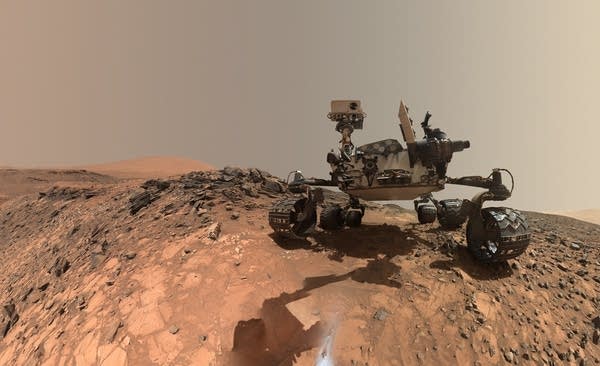How humans can get to Mars, and why we'd want to go

Mars is a very hostile place, and difficult to get to. So, why go? How does science — or society — benefit?
Scientists at SpaceX are currently hard at work answering the how.
"It's basically like, we're going to take a really big rocket and put a ridiculous amount of fuel on it and go to Mars really fast," Andy Weir said of the current plan to get people to Mars, presented by SpaceX CEO Elon Musk.
Weir is a computer scientist and the author of "The Martian," which was made into a movie starring Matt Damon. He said while he admires the "fail fast" ideology of SpaceX, the flaws in the plan may make it less than realistic. A test flight scheduled for 2020 and an expected budget of $200 million are wildly optimistic, Weir said, "and at no point did they ever mention who's going to pay for it."
Create a More Connected Minnesota
MPR News is your trusted resource for the news you need. With your support, MPR News brings accessible, courageous journalism and authentic conversation to everyone - free of paywalls and barriers. Your gift makes a difference.
Planetary scientist Pascal Lee agrees that Musk's plan isn't very realistic, but he doesn't want to call it impossible.
"Every time you have a new idea there are four stages to how people will react to it," Lee said. "Stage one is like, no it's not possible and it's not worth doing ... Stage two is, okay it's possible but it's still not worth doing. Stage three, as time goes by and things are happening people's reaction becomes 'okay it's possible, I always knew it.' And stage four is, 'oh yeah that was my idea'."
There needs to me more details to the plan, but Lee says not to give up hope, predicting that humans could make it to Mars' orbit by the 2030s, and to the surface in the 2040s.
But why go? A large motivator is the possibility of discovering something new, specifically life. "If we were able to find an alien form of life, something that does not map to the tree of life on earth, something that is very different — that would be a major, major discovery," Lee said.
And the odds of finding something could be pretty good according to Weir, "Since Mars has transitioned from an ocean world to the kind of crappy desert it is today — it was very slow, it happened over many millions of years — that's a slow enough process where life could have evolved to deal with that as well. So I believe that if there had ever been life on Mars it would be all over the place," Weir said, though it would probably only be microbial and even that is a debatable position.
Lee is less optimistic, saying that if life can't be found in the harsh environments on Earth — like the Arctic Circle — it's unlikely life could survive the savage surface of Mars.
Still the prospect of humans visiting Mars at all is exciting to both scientists, though whether they'd go themselves is another matter entirely.
Weir said he'd decline a seat on the Mars expedition, "I write about brave people. I'm not one of them."
Lee and Weir discussed this and more at the Commonwealth Club of California on October 19, 2016. The discussion was moderated by Mary Roach, author of "Packing for Mars."
To listen to the whole discussion, click the audio player above.
Further reading
• Atop machines of war, they rode into the sky
• New space telescope will take shape after launch
• New satellite provides weather forecast for the final frontier
MPR News presents offers speeches, documentaries and debates — airing weekdays from noon to 1 p.m